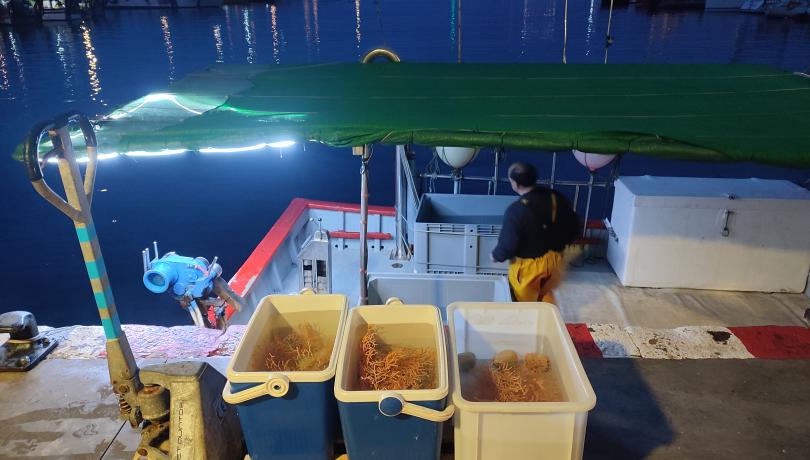The initiative aims to restore about 30,000 hectares of deep-sea habitats in Catalonia with the active participation of the fishing sector.

Fishermen participating in the LIFE ECOREST project, coordinated by the Institut de Ciències del Mar (ICM-CSIC), have begun the process of returning to the sea corals, gorgonians and sponges, among other sessile organisms that, after being rescued from fishing nets, have been recovered in aquariums installed in fishermen's guilds in Girona and Vilanova i la Geltrú (Barcelona). The first returns have taken place in Blanes and Llançà.
These organisms are returned to the sea in the permanently closed areas where the project operates using the Badminton method, a technique that consists of fixing the organisms to a boulder and returning them to the sea from the deck of the fishing boats. This process allows the organisms to reach the seabed and remain in an upright position, optimal for their survival.
To date, this methodology has been used in previous oceanographic campaigns developed by the ICM-CSIC and the University of Barcelona (UB) within the framework of the project, in which a total of 451 organisms have been released in four closed areas at a depth of between 90 and 140 meters. During these campaigns, a pioneering bio-releaser (BiLi) designed to adapt the Badminton method to great depths and to be able to release a greater number of individuals at the same time has been used. The gorgonians Eunicella cavolini, Eunicella singularis affita and Leptogorgia sarmentosa, bryozoans; the soft coral Alcyonium palmatum, as well as different species of demosponges, have been the main organisms returned in the oceanographic campaigns.
Thanks to the images obtained using a remotely operated underwater vehicle (ROV), it has been possible to verify the survival success of the restored gorgonians, which reaches 95% one year after the first return.
After the success of the oceanographic campaigns, a new stage of the project has begun, in which the return of organisms is carried out from the fishing boats.
Blanes and Llançà were the first fishermen's associations to return to the sea the organisms that were accidentally entangled in fishing nets and were transferred to the aquariums installed in their fishermen's associations, where they have been maintained and recovered thanks to the coordinated work of the ICM-ICM scientific team.
This joint effort has resulted in the rescue of more than 750 organisms from fishing nets and their recovery in aquariums to date.
Restoration of deep habitats
The LIFE ECOREST project is moving forward to restore nearly 30,000 hectares of deep-sea habitats in Catalonia with the active participation of the fishing sector.
In addition to research and conservation actions, it is also promoting the participatory management of fishermen who are part of the project, strengthening governance mechanisms and raising public awareness of the importance of conserving deep-sea habitats.
This initiative, coordinated by the Institut de Ciències del Mar (ICM-CSIC) until 2026, has as partners the Federació Territorial de Confraries de Pescadores de Girona, the Fundación Biodiversidad del Ministerio para la Transición Ecológica y el Reto Demográfico, the University of Barcelona and WWF Spain, as well as the financial contribution of the LIFE Program of the European Union.